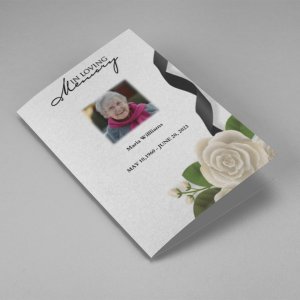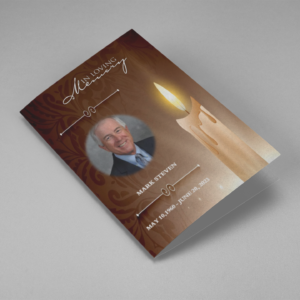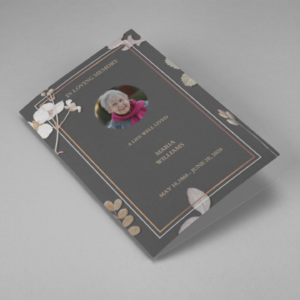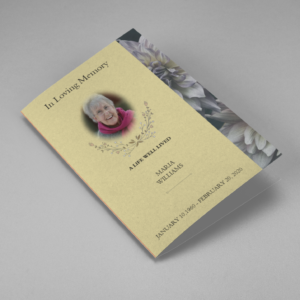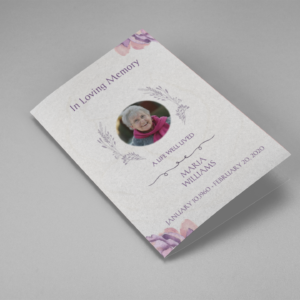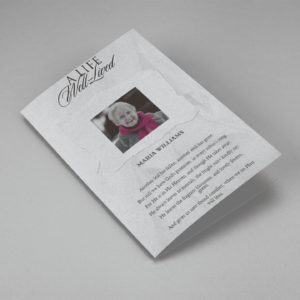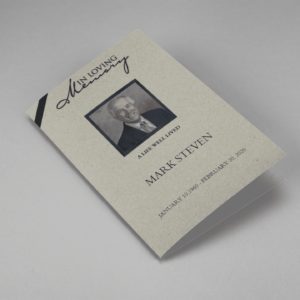Writing an obituary is a meaningful way to honor a loved one’s life. This guide provides detailed templates, tips, and examples to help you craft a heartfelt and memorable tribute.
What is an Obituary?
An obituary is a public notice of a person’s death, typically published in newspapers or online platforms. It serves to inform the community of the deceased’s passing, celebrate their life, and provide details about funeral services.
How to Write an Obituary
Step-by-Step Guide:
- Gather Information:
- Personal Details: Full name, date of birth, date of death, age.
- Life Events: Education, career, achievements, hobbies, and interests.
- Family: Names of surviving family members and those who preceded them in death.
- Choose a Style:
- Decide between a formal or informal tone.
- Consider incorporating humor if it suits the personality of the deceased.
- Drafting:
- Start with an outline covering key points: announcement, life summary, family, funeral details, and donations.
- Expand each point with specific details and anecdotes.
- Editing:
- Review for clarity, grammar, and impact.
- Ensure the obituary captures the essence of the deceased’s personality and life story.
Obituary Template and Format
Detailed Template with Examples:
- Announcement:
- “John Doe, 85, of Springfield, passed away peacefully on April 20, 2024.”
- Life Summary:
- “John was a dedicated teacher, passionate gardener, and beloved father. He earned his degree from XYZ University and taught at ABC High School for over 30 years.”
- Family Members:
- “He is survived by his wife, Jane; children, Mike and Lisa; and grandchildren, Emma and Noah.”
- Funeral Details:
- “A celebration of John’s life will be held on April 25, 2024, at Springfield Church at 2 PM.”
- Donation Information:
- “In lieu of flowers, donations can be made to the Springfield Animal Shelter.”
- Photos:
- Suggest including memorable photos that capture significant moments of the deceased’s life.
Examples of Great Obituaries
For a Mother:
“Mary Smith, a loving mother and accomplished artist, passed away on May 10, 2024. Her vibrant spirit and creativity touched many lives…”
For a Father:
“Robert Johnson, a decorated war veteran and devoted family man, left us on April 15, 2024. His legacy of courage and kindness…”
Short Obituaries:
“Jane Doe, 70, beloved nurse and community volunteer, died on April 5, 2024…”
Funny Obituaries:
“Tom Brown, 65, finally kicked the bucket after years of saying he would outlive us all…”
Tips for Writing a Memorable Obituary
- Storytelling: Share stories and memories that highlight the deceased’s personality.
- Emotion: Write from the heart and convey genuine emotion.
- Personalization: Include unique traits and quirks that made the person special.
- Avoid Overly Sensitive Information: Be mindful of privacy and respectful in tone.
- Length: Keep it concise but comprehensive enough to paint a full picture.
- Use Photos: Complement the text with meaningful photos.
Examples of Obituary Templates
-
Searching for a White Roses And Black Ribbon Funeral Program Template that is easy to print and has a cutting-edge look? White Roses And Black Ribbon Funeral Program Template is the Perfect decision because it measures 8.5”x 11”.
- No Limitation on Content, Edit anything
- Edit anytime – unlimited revisions even after purchased
- Get a printable PDF downloaded to get it printed on your own
-
Searching for a Realistic Burning Candle Funeral Program Template that is easy to print and has a cutting-edge look? Realistic Burning Candle Funeral Program Template is the Perfect decision because it measures 8.5”x 11”.
- No Limitation on Content, Edit anything
- Edit anytime – unlimited revisions even after purchased
- Get a printable PDF downloaded to get it printed on your own
-
Searching for a Bulltongue Arrowhead Funeral Program Template that is easy to print and has a cutting-edge look? Bulltongue Arrowhead Funeral Program Template is the Perfect decision because it measures 8.5”x 11”.
- No Limitation on Content, Edit anything
- Edit anytime – unlimited revisions even after purchased
- Get a printable PDF downloaded to get it printed on your own
-
Searching for a Grey Floral White Tiny Flower Funeral Program Template that is easy to print and has a cutting-edge look? Grey Floral White Tiny Flower Funeral Program Template is the Perfect decision because it measures 8.5”x 11”.
- No Limitation on Content, Edit anything
- Edit anytime – unlimited revisions even after purchased
- Get a printable PDF downloaded to get it printed on your own
-
Searching for a Red Flower Dark Soil Funeral Program Template that is easy to print and has a cutting-edge look? Red Flower Dark Soil Funeral Program Template is the Perfect decision because it measures 8.5”x 11”.
- No Limitation on Content, Edit anything
- Edit anytime – unlimited revisions even after purchased
- Get a printable PDF downloaded to get it printed on your own
-
Searching for a Pink Rose Frame Floral Oval Badge Funeral Program Template that is easy to print and has a cutting-edge look? Pink Rose Frame Floral Oval Badge Funeral Program Template is the Perfect decision because it measures 8.5”x 11”.
- No Limitation on Content, Edit anything
- Edit anytime – unlimited revisions even after purchased
- Get a printable PDF downloaded to get it printed on your own
-
Searching for a Brown and White Classic Funeral Program Template that is easy to print and has a cutting-edge look? Brown and White Classic Funeral Program Template is the Perfect decision because it measures 8.5”x 11”.
- No Limitation on Content, Edit anything
- Edit anytime – unlimited revisions even after purchased
- Get a printable PDF downloaded to get it printed on your own
-
Searching for a Purple Elegant Watercolor Funeral Program Template that is easy to print and has a cutting-edge look? Purple Elegant Watercolor Funeral Program Template is the Perfect decision because it measures 8.5”x 11”.
- No Limitation on Content, Edit anything
- Edit anytime – unlimited revisions even after purchased
- Get a printable PDF downloaded to get it printed on your own
-
Searching for a Cream and Green Photo Obituary Program that is easy to print and has a cutting-edge look? Cream and Green Photo Obituary Program is the Perfect decision because it measures 8.5”x 11”.
- No Limitation on Content, Edit anything
- Edit anytime – unlimited revisions even after purchased
- Get a printable PDF downloaded to get it printed on your own
-
Searching for a Cream Simple Elegant Photo Church Program that is easy to print and has a cutting-edge look? Cream Simple Elegant Photo Church Program is the Perfect decision because it measures 8.5”x 11”.
- No Limitation on Content, Edit anything
- Edit anytime – unlimited revisions even after purchased
- Get a printable PDF downloaded to get it printed on your own
-
Searching for a Grey Classic Minimalist Funeral Program Template that is easy to print and has a cutting-edge look? Grey Classic Minimalist Funeral Program Template is the Perfect decision because it measures 8.5”x 11”.
- No Limitation on Content, Edit anything
- Edit anytime – unlimited revisions even after purchased
- Get a printable PDF downloaded to get it printed on your own
-
Searching for a White Classic Funeral Program Template that is easy to print and has a cutting-edge look? White Classic Funeral Program Template is the Perfect decision because it measures 8.5”x 11”.
- No Limitation on Content, Edit anything
- Edit anytime – unlimited revisions even after purchased
- Get a printable PDF downloaded to get it printed on your own
-
Searching for a Cream Gold Marble Funeral Program Template that is easy to print and has a cutting-edge look? Cream Gold Marble Funeral Program Template is the Perfect decision because it measures 8.5”x 11”.
- No Limitation on Content, Edit anything
- Edit anytime – unlimited revisions even after purchased
- Get a printable PDF downloaded to get it printed on your own
-
Searching for an Elegant Beige Funeral Program Template that is easy to print and has a cutting-edge look? Elegant Beige Funeral Program Template is the Perfect decision because is has a measure of 8.5”x 11”.
- No Limitation on Content, Edit anything
- Edit anytime – unlimited revisions even after purchased
- Get a printable PDF downloaded to get it printed on your own
-
Searching for a White Floral Pro Funeral Program Template that is easy to print and has a cutting-edge look? White Floral Pro Funeral Program Template is the Perfect decision because is has a measure of 8.5”x 11”.
- No Limitation on Content, Edit anything
- Edit anytime – unlimited revisions even after purchased
- Get a printable PDF downloaded to get it printed on your own
-
Searching for a Grey and Burgundy Elegant Funeral Program Template that is easy to print and has a cutting-edge look? Grey and Burgundy Elegant Funeral Program Template is the Perfect decision because is has a measure of 8.5”x 11”.
- No Limitation on Content, Edit anything
- Edit anytime – unlimited revisions even after purchased
- Get a printable PDF downloaded to get it printed on your own
-
Searching for a Creative Watercolor Floral Funeral Program Template that is easy to print and has a cutting-edge look? Creative Watercolor Floral Funeral Program Template is the Perfect decision because is has a measure of 8.5”x 11”.
- No Limitation on Content, Edit anything
- Edit anytime – unlimited revisions even after purchased
- Get a printable PDF downloaded to get it printed on your own
Frequently Asked Questions
What is an obituary?
An obituary is a written notice of someone’s death, typically published in newspapers or online, that provides a brief biography of the deceased and details about funeral services.
How long should an obituary be?
An obituary typically ranges from 200 to 500 words, but it can be longer or shorter depending on the amount of information you wish to include.
What information should be included in an obituary?
Include the deceased’s full name, age, date of death, brief biography (education, career, achievements), names of surviving family members, details of funeral services, and any donation requests.
Can I include humor in an obituary?
Yes, including humor can be appropriate if it reflects the personality of the deceased and is done respectfully.
How do I publish an obituary?
You can publish an obituary in local newspapers, on funeral home websites, or on dedicated obituary websites. Online platforms offer a wider reach and often allow for sharing on social media.
Should I include cause of death in the obituary?
Including the cause of death is optional. Some families choose to share this information, while others prefer to keep it private.
How can I make the obituary personal and unique?
Share personal anecdotes, hobbies, passions, and special traits of the deceased. Include memorable stories that highlight their character and impact on others.
Is it necessary to mention all family members in the obituary?
Mentioning close family members (spouse, children, parents, siblings) is common. You can also mention other significant relatives or friends if desired.
Need more help?
For additional resources and tools to write a meaningful obituary, visit our website or contact us directly.

